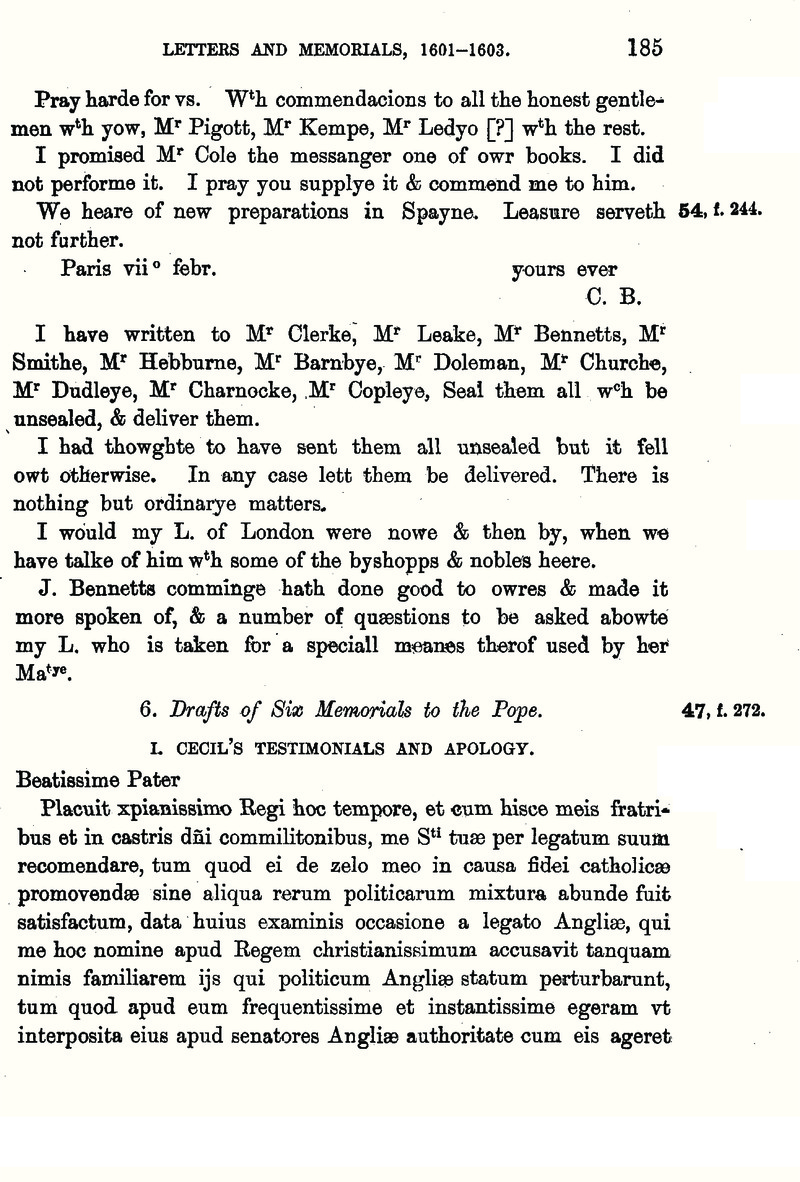No CrossRef data available.
Article contents
6. Drafts of Six Memorials to the Pope
Published online by Cambridge University Press: 24 December 2009
Abstract

- Type
- III. Letters and Memorials, 1601–1603
- Information
- Copyright
- Copyright © Royal Historical Society 1898
References
Page 185 note a The clause within brackets partially erased, and the two or three lines indicated by dots entirely erased.
Page 185 note b Added in the margin.
Page 187 note a François d'Esooubleau de Sourdis, created cardinal in 1592.
Page 189 note b Inserted above the line.
Page 190 note a “John” must be a slip of the pen for “Robert.” There was no John Fisher at the English College at this date. Robert, who took a principal part in the drawing up of the memorial against the Jesuita, came to Bheims in Maroh 1590, and was admitted at the age of twenty-two into the college at Borne July 8, 1593. He left in May 1596, when he was busy with the affairs of the malcontent clergy, both in England and on the continent. Dr. Barret, who was watching his movements and hoping to get him apprehended in Belgium, wrote to Parsons, Aug. 10, 1597, as follows: “Very loving and reverend Father, this I wryte at Liege where I am in my way homeward [from Spa to Bheims]. There passed by this towne one Fisher, that was sent by the seditious schollers into England, from hence he went to Bruxelles, thence to Lisle, and so to Do way, and thence to Cambray. He hath bin, as I am informed, in every shire in England to styrre up men against Jesuits and Spaniards, which he uttered to a good man in this towne. I marvaile he escaped at Bruxels, seing they are advertised out of England of his secret conference with a cheefe man of the councel of England & with Sacheverel the Apostata in the said councelors house. Heere he tould one in great secret, that he was to go to M. Ch. Pa[get] and D. Gifford, and to M. Morgan about matters of importance, he said also that they were in good hope to have liberty of conscience in England in case they might get the Jesuits thence, no doubt this is one part of his busynes, he left his bag at Liege & I have seene it, yet nothing of importance therin, saving a little compendious note of all their Articles against the Jesuits at Rome which he carried with him to dilate to the faction in England as appereth, for it is very old and almost worne out. [This note was rather brought out of England. As after will appeare. Parsons' marginal note.] I am to go to Bruxels and to make means to have the man examined, in case he may be found ; before he return to this towne, for he is to come back hither & to one in this place, he was at hia going into England earnestly commended by D. Gifford, &c.” Some months afterwards Fisher reappeared in Rome, “half converted,” writes Parsons, and “willingly offered himself” at the English College, where he was put through an examination extending over several days by the Papal fiscal. In this examination he made many statements, which are printed by Parsons in his Apologie (ff. 94–97), to the discredit of the anti-Jesuit party. These statements, which Parsons admitted were not altogether trustworthy, were said by Dr. Ely to have been extorted from “the miserable fellow” by fear of the gallies or the gallows; and Bagshaw declares that Parsons had threatened “to put hot irons to his arms” to get him to say what he did. Fisher had been apparently banished into Spain, and kept under restraint there for the past five and a half years, not “seven years,” as in this petition; and the Appellants now pray for his release and a fresh trial in the belief that when free from undue influence he would give a truer and more favourable colour to the conduct of his friends.


